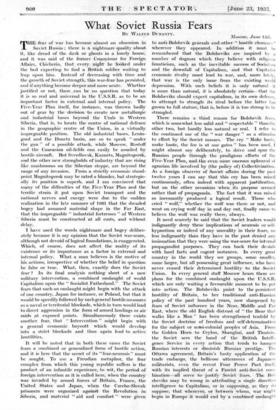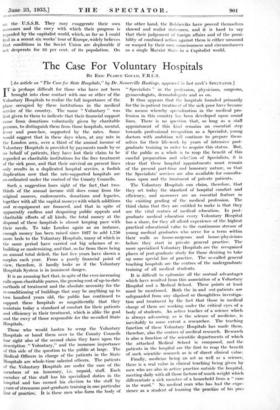What Soviet Russia Fears
BY WALTER DURANTY.
rpnE. fear of war has become -almost an obsession in Soviet Russia; there is a nightmare quality about - it, like dread of the dark or ghosts in a lonely house; and it was said of the former Cocnrnissar for Foreign. Affairs, Chicherin, that every. night- he Slboked. under the bed expecting to find a British soldier waiting to leap upon him. Instead of decreasing with time and the growth of Soviet strength; this war-fear has persisted, and if anything become deeper and more acute. Whether justified or not, there , can be no question that today it is so real and universal in the U,S.S.R. as to be an important factor in external and internal policy. The Five-Year Plan itself, for instance, was thrown badly out of gear by the decision •to • create new metallurgic and industrial bases beyond the Urals in Western Siberia, that is, to locate the centre of national defence in the geographic centre of the Union, in a. virtually impregnable position. The old industrial bases, Lenin- grad and the Donetz basin, are so to speak " under the gun " of a possible attack, while Moscow, Rostoff and the Caucasian oil-fields can easily be assailed by hostile aircraft. But Sverdlovsk, Kuznets, Magnitogorsk, and the other new strongholds of industry that are rising like , mushrooms on the. Siberian steppe, are beyond the' range of any invasion. From a strictly economic.stand-. point Magnitogorsk may be rated a blunder, but strategic ally its , position is superb, and I am convinced that many of the difficulties of the _Five-Year Plan and the terrific strain it put upon Soviet transport and the national nerves and energy were due to the sudden realization in the late summer of 1931 that the dreaded bogey had assumed material shape in the Far East, that the impregnable " industrial fortresses ".of Western - Siberia must be constructed at all costs, and without. delay.
I have used the words nightmare and bogey deliber- ately because it is my opinion that the Soviet war-scare, although not devoid of logical foundations, is exaggerated. Which, of course, does not affect the reality of its existence or its importance as a factor in external and internal policy. What a man believes is the motive of his. actions, irrespective of whether the belief in question be false or true. 'What, then, exactly does the Soviet fear ? In its final analysis nothing short of a new military intervention, a combined onslaught of world Capitalism upon the " Socialist Fatherland." _ The Soviet fears that such an onslaught might begin with the attack of one country, Japan for instance, or Poland, but that it would be speedily followed by such general hostile measures as a naval or territorial blockade, which in turn would lead to direct aggression in the form of armed landings or air raids at exposed points. Simultaneously there exists another fear, that " Intervention " might begin with a' general economic boycott which -would develop into a strict blockade and thus again lead to active hostilities.
It will be noted that in both these cases the Soviet fears a combined or generalized form of hostile action, and it is here that the secret of its " fear-neurosis " must' be sought. To use a Freudian metaphor, the fear complex from which this young republic suffers is the product, of an infantile experience, to . wit,: the period of- foreign intervention as it is called here; when:the- country was invaded by armed forces of Britain, France, the United States and Japan, when the Czeeho-Slovak prisoners were organized against the Revolution in Siberia, and material " aid and comfort " were given Moscow, June 151k. to anti-Bolshevik generals and other " hostile elements" wherever they appeared. In addition it must be remembered that the Bolsheviks are inspired by a number of dogmas which they believe with .religions fanaticism,- such as the inevitable success of Socialism and the downfall of 'Capitalism, and that Capitalist economic rivalry must lead to war, and, more lately, that war is the only_ issue from the existing world depression. With_ such beliefs it is only natural—it is more than natural, it is absolutely certain-T-that the Bolsheviks should expect capitalism, in its own defence, to attempt to strangle its . rival before the latter has grown to full stature, that is, before it is too strong to be strangled.
There remains a third- reason for Bolshevik fears, which is somewhat less solid .and " respectable " than the other two, but hardly less natural or real. I refer to the continued use' of the " war danger ' as a stimulus to effort by the -Soviet masses. The cry ." Make haste, make haste, the foe is at our gates " has been used, I might almost say deliberately, to drive and spur. the Russian people through the . prodigious efforts of the Five-Year Plant, andi-tlie even: more onerous upheaval of agrarian life 'involved_ by (the policy of) Collectiviiation. As a foreign observer of Soviet affairs during the past twelve years I can say that this cry has been raised continuously, often, indeed with apparent justification, but on the other occasions. when its purpose _ seemed rather that of propaganda. The fact -that it was raised so incessantly produced a logical result. Those who cried " wolf," whether the wolf was there or not, and went on crying wolf day in and day out, finally came to believe the wolf was really there, always.
It need scarcely be said that the Soviet leaders would indignantly deny these implications of neurosis or self- hypnotism or indeed :of any unreality in their- fears, no . less indignantly than they . have in the past denied any insinuation that they were using the war-scare for internal propagandist purposes. They". can back their denials with hard facts and cogent instances. In every great country in the ,world they see groups, sortie smaller, some larger, but all' possessing great influence, -who have never ceased their determined • hostility _to ;the- Soviet Union. In every general staff Moscow hears_ there are plans for the combined onslaught upon the U.S.S.R. which are only waiting -a favourable moment to be: put into action. The Bolsheviks point to the persistent hostility of Britain, . to - her traditional anti-Russian pOlicy of: the - past hundred years, now sharpened by feara of Soviet influence in the Near, Middle and Far EaSt, where the old English distrust of " the Bear that walks like a Man " has been strengthened tenfold by the Soviet' doctrine of freedom and self-determination for the subject or semi-colonial peoples of Asia. From the Golden Horn-Ao "Ceylon, . Shanghai, and Tientsin, the Soviet . sees the. hand of the British Intelli- gence Service in every action that tends to hamper Russian - interests or diminish Russian prestige. The Ottawa agreement, Britain's hasty application of the trade embargo, the bellicose -utterances of Japanese militarists, even the recent Four Power Pact itself, With its implied threat . Of a Fascist anti-Soviet com- bination—all. serve to justify Soviet 'fears. -The Bol- sheviks may be wrong in attributing a single directive intelligence to Capitalism, or in supposing,. as they do suppose, that wherever, or between whom, war might begin in Europe it would end by a combined onslaught on the U.S.S.R. They may exaggerate their own successes and the envy with which their progress is regarded by the capitalist world, which, as far as I Could find in a recent six weeks' tour of Europe, widely believes that conditions in the Soviet Union are deplorable if not desperate for 95 per cent, of its population. On the other hand, the Bolsheviks have proved themselves shrewd and realist statesmen, and it is hard to say that their judgement of foreign affairs and of the possi- bility of combined action against them is either unsound or warped by their own consciousness and circumstances as a single Marxist State in a Capitalist world.









































 Previous page
Previous page